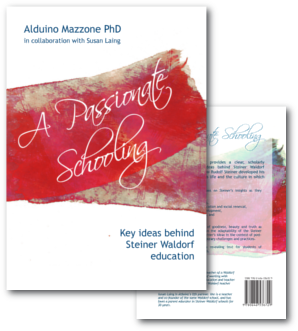A Passionate Schooling
About the Book
Download Sample Chapter Download Table of Contents
A Passionate Schooling provides a clear, scholarly overview of the key ideas behind Steiner Waldorf education. It examines how Rudolf Steiner developed his ideas in the context of his life and the culture in which he lived.
A Passionate Schooling focuses on Steiner's insights as they relate to:
- the nature of the human being,
- freedom and the ideals of education and social renewal,
- new perspectives on child development,
- the evolution of consciousness, and
- the transformation of the self.
It also explores the concepts of goodness, beauty and truth as ideals in education, as well as the adaptability of the Steiner Curriculum. It re-interprets Steiner's ideas in the context of post-modernist thought and contemporary challenges and practices.
A Passionate Schooling is a revealing text for students of education, teachers and parents.
Dr Alduino Mazzone is a founding teacher of a Waldorf school who has had over 35 years of working with anthroposophy, Steiner Waldorf education and teacher education. His PhD was on Steiner Waldorf teacher education.
Susan Laing is Alduino's life partner. She is a teacher and co-founder of the same Waldorf school, and has been a parent educator in Steiner Waldorf schools for 20 years.
Content of the book
Biographical sketch
The book begins with Rudolf Steiner's biography and the historical context in which his ideas arose and aims to highlight the wide ranging and complex nature of his work.
1. Science of the Invisible
This chapter describes the unique combination of skills Steiner brought to the development of his ideas and his science of the spirit which he called anthroposophy: rigorous scientific observation, philosophical thinking and unusual clairvoyant ability.
2. Nature of Freedom and Thinking
This section explores Steiner's ideas about freedom, the nature of knowledge and thinking, and his argument that ‘thinking’ is a ‘spiritual activity’.
3. The Nature of Human Being
This chapter examines the complex makeup of the human being, both material and non material, body soul and spirit, and in particular how this relates to self development and our lower and higher nature.
4. Patterns in Human Development
This describes in more depth the rhythmical unfolding of development in children in all their aspects, physical, intellectual, emotional/social and in consciousness, in their discovery of ‘self’. It stresses the importance of recognising the stages in children's development and the necessity of age appropriateness in life activities and the curriculum.
5. Evolution of Consciousness, Recapitulation & the Waldorf Curriculum
This examines how human consciousness has developed through time and how the Waldorf curriculum attempts to meet the child's consciousness at particular ages.
6. The Education of the Threefold Human Being & Three Ideals of Truth, Beauty and Goodness
Download this chapter as a pdf
This chapter explores the ideals of truth, beauty and goodness and their importance in education for providing strength, richness and optimism for the evolving sense of self.
7. ‘The Christ’ in Anthroposophy, Reincarnation and Karma
This section looks at more difficult concepts: the place of ‘the universal Christ’, reincarnation and karma in anthroposophy and as realities for teachers.
8. Steiner's Social Theory: How the Waldorf Schools Arose from the Threefold Social Order
This theory suggests that the structure and organization of society and schools should reflect the nature of the human being.
Bibliography and index provided for further research and reading.
Who Should Read this Book? Individual, Group Study and Course Text.
This book provides an overview of the key ideas behind Steiner Waldorf education. While it contains complex ideas, it aims to be succinct and readable, inviting the reader to examine the content in an open unprejudiced way. It is a useful supportive text for any study of this education, professional or general, or as a basis for a study group.
Ideal for individual and group study for:
- general public and parents interested in deepening their understanding of Steiner Waldorf Schools
- teachers in Steiner Waldorf schools especially those new to this education and anthroposophy
- students studying progressive education at university/tertiary education level, anthroposophy and Steiner Waldorf education. Though not a strictly academic text, it is supported by references, bibliography and index for academic work or further research.
